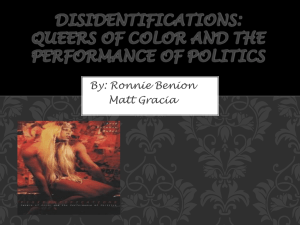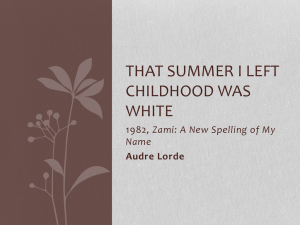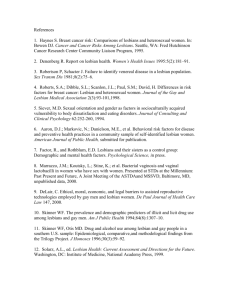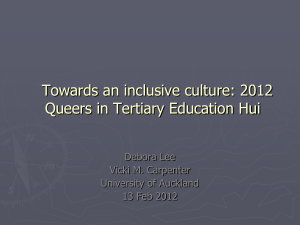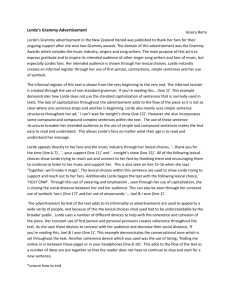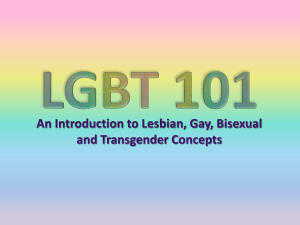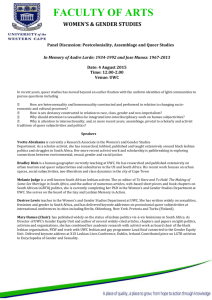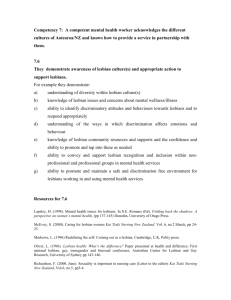Sister Outsider: An Enduring Vision: Embracing
advertisement
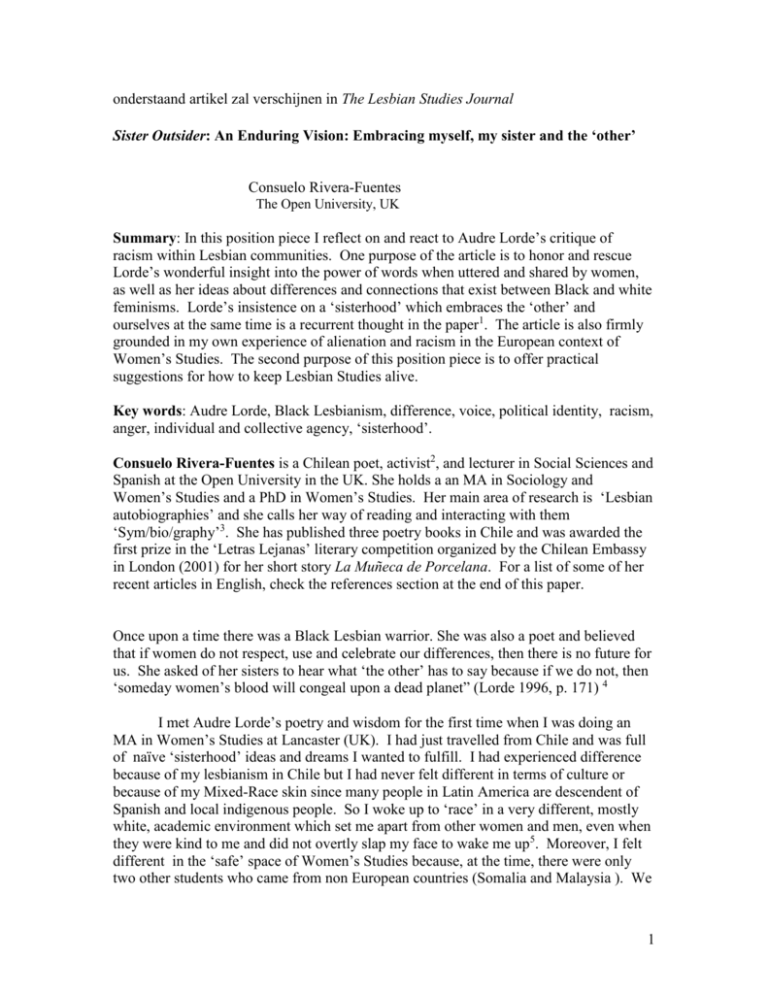
onderstaand artikel zal verschijnen in The Lesbian Studies Journal Sister Outsider: An Enduring Vision: Embracing myself, my sister and the ‘other’ Consuelo Rivera-Fuentes The Open University, UK Summary: In this position piece I reflect on and react to Audre Lorde’s critique of racism within Lesbian communities. One purpose of the article is to honor and rescue Lorde’s wonderful insight into the power of words when uttered and shared by women, as well as her ideas about differences and connections that exist between Black and white feminisms. Lorde’s insistence on a ‘sisterhood’ which embraces the ‘other’ and ourselves at the same time is a recurrent thought in the paper1. The article is also firmly grounded in my own experience of alienation and racism in the European context of Women’s Studies. The second purpose of this position piece is to offer practical suggestions for how to keep Lesbian Studies alive. Key words: Audre Lorde, Black Lesbianism, difference, voice, political identity, racism, anger, individual and collective agency, ‘sisterhood’. Consuelo Rivera-Fuentes is a Chilean poet, activist2, and lecturer in Social Sciences and Spanish at the Open University in the UK. She holds a an MA in Sociology and Women’s Studies and a PhD in Women’s Studies. Her main area of research is ‘Lesbian autobiographies’ and she calls her way of reading and interacting with them ‘Sym/bio/graphy’3. She has published three poetry books in Chile and was awarded the first prize in the ‘Letras Lejanas’ literary competition organized by the Chilean Embassy in London (2001) for her short story La Muñeca de Porcelana. For a list of some of her recent articles in English, check the references section at the end of this paper. Once upon a time there was a Black Lesbian warrior. She was also a poet and believed that if women do not respect, use and celebrate our differences, then there is no future for us. She asked of her sisters to hear what ‘the other’ has to say because if we do not, then ‘someday women’s blood will congeal upon a dead planet” (Lorde 1996, p. 171) 4 I met Audre Lorde’s poetry and wisdom for the first time when I was doing an MA in Women’s Studies at Lancaster (UK). I had just travelled from Chile and was full of naïve ‘sisterhood’ ideas and dreams I wanted to fulfill. I had experienced difference because of my lesbianism in Chile but I had never felt different in terms of culture or because of my Mixed-Race skin since many people in Latin America are descendent of Spanish and local indigenous people. So I woke up to ‘race’ in a very different, mostly white, academic environment which set me apart from other women and men, even when they were kind to me and did not overtly slap my face to wake me up5. Moreover, I felt different in the ‘safe’ space of Women’s Studies because, at the time, there were only two other students who came from non European countries (Somalia and Malaysia ). We 1 were feeling a bit raw, confused, and alienated and could not understand what was wrong with being Mixed-Race, Black, Asian and vocal6. Those two women and myself recognized each other immediately and were drawn together by the absence of issues in the curriculum that addressed our experiences and the need to get out of what we perceived as western European frames of reference. Then, I read Zami7 (1982) and Lorde’s narrative and poetry made me thirsty for more of her work, so I read The Audre Lorde Compendium (1996) where Sister Outsider, A Burst of Light and The Cancer Journals filled me with emotions, feelings and knowledge of myself and the world around me that I had suppressed for a long time. And I dreamed of Audre Lorde and her voice. In that dream she smiled and told me: ‘I am your sister’ and I believed her. She told me that “Black feminism is not white feminism in Blackface” (Lorde, 1996, p.113) 8 and that the power of one’s own voice and words is infinitely better than a thousand articles written by white men and women on or about Black women but which “dismiss my heritage and the heritage of all other noneuropean women, and den[y] the real connections between all of us” (Lorde 1996, p.121)9. Looking at me over the rim of her glasses she warned me that words can also be full of violence and that “[t]here are so many roots to the tree of /anger/ that sometimes the branches shatter/ before they bear”10 and that this could leave me silent . But then she added that silence is also powerful and that I should not be afraid of it. Neither should I be afraid of difference, she added, because we need it to keep us alive and to form alliances.11 So when I woke up from this dream I decided to transform myself and to be even more vocal and active than before12. I knew that this would create trouble with my fellow students and lecturers in Women’s Studies and that I would have to swim naked in a river of unrecognized feelings and contradictions and that the coldness of the English waters could leave me numb. I did and have come out of the river, shivering but energized by a refreshing chill flowing between bone and flesh. I have come out but from time to time I undress myself again and my brown body - sagging a bit now – plunges in icy waters knowing that when I come out of the lake, river or sea I will be greeted by smiling – sometimes grimacing women who will just move their heads and think that I am a crazy Latin American Mixed-Race Feminist Lesbian. But they never leave me standing there shivering, someone will always come to hug and dry me sharing her warmth with me. And this is not just compassion, it is also the recognition that we need each other to come out of the icy waters of a false sisterhood that denies and ignores our individual and collective desires. It is the reaction of these few women that makes me feel there is a future for Lesbian Studies. Not all of us are able or want to swim in icy water, not all of us “beat the same drum or play the same tune all the time”, as Audre Lorde said once13, but if we embrace ourselves, our sisters and ‘the other’14 then the future will happen and it will be warm. So how can we be sure that there is a future for Lesbian Studies? In their introduction to the Handbook of Lesbian and Gay Studies, Richardson and Seidman, eds. 2000, give a historical and theoretical overview of the development of Lesbian and gay studies and tell us that before World War II there were mainly two models that theorized about homosexuality, namely, the medical15 and the psychiatric16. They go on to tell us that after WW II there was an increased visibility and the creation of gay and Lesbian research groups and organisations which, of course brought about increasing 2 discrimination and harassment (ibid. pp.1-2). In order to face this discrimination and to challenge both the medical and the psychiatric models, gay and Lesbian groups adopted two important political strategies: first they stated that if homosexuality17 was the result of a psychiatric disorder, then it should be treated and not punished. The aim of this strategy was to decriminalize homosexuality. The second strategy was to say that homosexuals were as normal as heterosexuals. This both challenged and reversed the medical model. Political strategies, gave way, eventually, to the emergence of sociological approaches which viewed homosexuals as a victimized social minority. Richardson and Seidman (ibid.) go on to state that during the 1960’s and 1970’s, “women’s and gay’s liberation movements proposed a view of homosexuality as a social and political identity.” (ibid. p.2). An example of this was that [l]esbians argued that being a lesbian is a political act that challenges both the norm of heterosexuality and men’s dominance. To be a lesbian is to choose to live a life apart from men and to make women the center of one’s personal and social life (Richardson and Seidman, 2000, p.2)18 The political choice of a lesbian identity in a hostile heterosexual environment was not easy and created many internal conflicts in feminist and gay movements because, some people thought, it did not take into account other identities such as race, class, nationality, gender or age which cannot be separated from one’s sexual identity. This gave way to other perspectives and epistemological movements, such as the social constructionist views and queer theory in gay and Lesbian studies. Queer theorists try to “expand politics beyond identity politics”, as Richardson and Seidman (ibid., p.4) assert, by focusing on social and political structures that restrain the free expression of someone’s sexuality and by emphasizing “the fluid, performative character of identities” (ibid. p.5). I must say that, although queer theory criticizes gay movements which are largely male-oriented, white middle- class and which focus only on rights and social acceptance19, they do not have a clear proposal on how to change power structures. At least with identity politics one can exert individual and collective agency. We can exert individual and collective agency by lesbianising ourselves ‘in relation’. This ‘in relation’ cannot happen if differences are not acknowledged. ‘In relation’ cannot happen if, when I go to conferences, there is the odd ‘token’ Black lesbian. ‘In relation’ will never happen if whenever women, Black people, gays and Lesbians attempt to address the oppression of sexism, racism and homophobia in academic contexts such as universities, we are described as aggressive, hostile, even violent. Why is it that when I talk to my students about my lesbianism, my experiences of racism, rape and torture, white men and women (especially young people) comment afterwards that I am so angry, that they cannot understand because it has not been their experience and that I am trying to make them feel uncomfortable and that I am directing my anger at them? It is then, and only then, that I feel my anger rise like lava contained in the volcano of my Latino body. But then, Lorde, the Black Lesbian Warrior whispers in my ear that anger is actually “an appropriate reaction to racist attitudes’ (Audre Lorde, 1984, p.129)20. These are Women’s Studies students but they still think that racism is not their responsibility and that all I am achieving is make them feel guilty. Audre Lorde said that 3 [G]uilt is not a response to anger; it is a response to one’s own action or lack of action. If it leads to change, then it can be useful, since it is no longer guilt but the beginning of knowledge. Yet all too often, guilt is just another name for impotence, for defensiveness destructive of communication, it becomes a device to protect ignorance and the continuation of things the way they are, the ultimate protection for changelessness (A. Lorde, 1984, p.130). So I let myself be angry and hope that my students’ feeling of guilt is the beginning of change and the development of consciousness because it is never too late to develop. The future of Lesbian Studies has to include myself and my contradictions, my difference, my anger, my brown Mixed-Race body, my ways of changing reality from ‘within’. It must respect and know of the lives and creativity of lesbians who came before us because without their ‘Lesbianstories’ we would be simply ‘a group’ of women who cannot influence or exert any changes in society. Any future needs the younger thoughts and feelings of the Lesbians who are, as I write this, growing glittering wings despite the homophobic, racist human beings still left on this earth waiting for them to come out fully so they can bully and harass them so as to undermine their sense of identity. The future of Lesbian Studies has to listen to my mother’s voice, to the silent scream and making of revolution of my sisters in Latin America, to the poverty and strength of my sisters in Africa. If there is a future for Lesbian Studies this has to be full of the songs, words and stories of my sisters in the Middle East, Asia and Australasia. It is not enough to inhabit a virtual village of Lesbians somewhere in the colourful spatial wires of the internet; the future of Lesbian Studies must also come down to earth and create a place like Zami’s Carriacou where “women work together as friends and lovers” (Zami, p.225), a place where I can smell and taste the sweat, the juices, the tears and the laughter of the ‘other’. If there is going to be any future in Lesbian Studies, our European and North American sisters, framed by centuries of colonial and capitalist past and present, must wake up and organize conferences where the proportion of Black and white women is similar both in presence and in active participation. Maybe the future of Lesbian Studies needs that my Mixed-Race Latina and Black Lesbian sisters begin to accept invitations to attend these conferences and thus influence what issues and actions are to be put in the agenda and programmes. The future of Lesbian Studies must have a vision, artists, allies, intellectuals, activists. We must learn to dance together and invite ‘the other’ to join us. We must work and “organize around our differences, neither denying them nor blowing them out of proportion” (Lorde, 1996, p.251) 21. Finally, Lesbian Studies has to include all those women who have never learned to write a ‘proper’ article with exact references and bibliography but who can tell wonderful Lesbianstories of resistance and defiance to racist, sexist and homophobic attitudes and who, if we listen to them, can teach us the power of Black women’s voices to imagine better places and times. Each one of us has surely heard or read of other Black and white Lesbians’ dreams and stories. Can you imagine the countless stories we have together and the power of all the dreams we hold? Share yours and maybe there will be a future for Lesbian Studies. 4 Endnotes An anonymous reader of this piece, suggested that it “shares many of the sentiments expressed in” Sharon P. Holland’s “Humanity is not a Luxury: Some Thoughts on a Recent Passing” in Linda Garber, ed. 1994. Although I have not had the chance to read this publication, I agree with the anonymous reader that it is important to point out that many women critique racism within Lesbian communities. The notes below mention some of these authors; see especially note 12. 2 As an activist she was imprisoned and tortured for opposing Chilean Dictatorship in the 80’s. She is one of the founders of a Chilean Lesbian group called LEA. The ‘her-story’ of the creation of this organization appears in ‘Todas Locas, Todas Vivas, Todas Libres: Chilean Lesbians 1980-95. (Rivera-Fuentes, Consuelo, in Reinfelder, M. 1996) 3 See, for example, “Doing Sym/bio/graphy with Yasna” (Rivera-Fuentes, Consuelo, in Cosslett, T. et al, eds. 2000) 4 From “Outlines”, unpublished poem, cited in The Audre Lorde Compendium: Essays, Speeches and Journals. 5 For a longer explanation of this process of waking up to ‘race’, refer to Rivera-Fuentes, Consuelo.“Two Stories, Three Lovers and the Creation of Meaning in a Black Lesbian Autobiography”. In Heidi Safia Mirza, ed. Black British Feminism: A Reader. 1997: pp. 216-225 6 I write the words Mixed-Race, Lesbian, Black and Asian in capitals to emphasize my strong political commitment to these categories, so that they stand out loud and proud. 7 Audre Lorde (1982) Zami: A New Spelling of my Name. From now on Zami 8 From Lorde (1996) “Sexism: An American Disease in Blackface “ in Sister Outsider in The Audre Lorde Compendium 9 From Lorde (1996) ”An Open Letter to Mary Daly” in Sister Outsider in The Audre Lorde Compendium 10 From Lorde’s unpublished poem Who said it was Simple. I heard this poem in a conference and wrote it down, but I cannot provide more references for it. 11 Many Black women and men share this idea of difference and alliances as vital to influence and exert transformation. Moraga and Anzaldúa (1981), Avtar Brah (1992), and Sara Ahmed (1997) are examples of this. 12 I am, of course, not the only woman to be inspired by Lorde’s work. Critics such as Jeanne Perrault (1995), Cherrie Moraga and Gloria Anzaldúa (1981) who address the question – central to identity and relationality in feminist politics - of the construction of categories such as ‘I’ and ‘we’ have, for example started from Lorde’s assertion that “If we don’t name ourselves we are nothing” (Lorde, 1980). When it comes to the concept of difference and Lorde’s suggestion that to exert radical change we need to examine difference an incorporate it into our lives and politics, authors such as Cherrie Moraga (1983), Aurora Levins Morales and Rosario Morales (1986) and Gloria Anzaldúa ( 1987) have concluded that what separates women is not difference in itself but the fear of recognizing it as something that that we have been programmed to respond to not only with fear but also with loathing. Lorde’s influential Zami, has been an inspiration to many, amongst which I can mention Erin G. Carlston’s “Zami and the Politics of Plural Identity” (1993), Anna Wilson’s “Audre Lorde and the African-American Tradition: When the Family is not Enough” (1992), Katie King’s “Audre Lorde’s Lacquered Layerings: The Lesbian Bar as a Site of Literary Production” (1992), etc. 13 She said this in a conference in her honor in Boston 1992. The conference was entitled: The Edge of Each Other’s Battles: The Vision of Audre Lorde.. 14 I use ‘the other’ to signify those people who are not myself, or the ones I call my sisters but those who can become our allies in the fight against racism, ‘disablism’ and homophobia. 15 This model viewed homosexuality as an inherited or learned identity and as a form of sexual or gender deviance (ref. p.2) 16 The psychiatric model viewed homosexuals as a human type which was abnormal. 17 I am using the concept of ‘homosexuality’ and ‘homosexuals’ as used in Richardson and Seidman above, despite my political preference for the more comprehensive categories of gay, lesbian, bisexual, transsexual and transgender people. 18 This reminds me of the words of a Latina called Lupita in the conference in honor of Audre Lorde in Boston. She said: “I’ve been in revolution for thirty years. When I fell in love with a woman, I started a revolution in myself” 1 5 19 I have not enough space for a more thorough analysis of queer theory (also this is not the focus of this piece) but there are various articles within the Handbook of Lesbian and Gay Studies edited by Richardson and Seidman , 2000, which deal with queer theory. See for example: “From Liberation to Transgression and beyond: Gay, Lesbian and queer Studies at the turn of the Twenty-first Century” (Barry D. Adam);” Queer Bodies and the Production of Space” (Gill Valentine); “Queer Diaspora” (Anne-Marie Fortier) and so on. 20 Audre Lorde (1984) “The Uses of Anger: Women responding to Racism” in Sister Outsider: Essays and Speeches. 21 From Lorde’s speech “I Am Your Sister: Black Women Organizing Across Sexualities” in ‘A Burst of Light’ in The Audre Lorde Compendium (1996) 6 References Adams, Barry. “From Liberation to Transgression and Beyond: Gay, Lesbian and Queer Studies at the Turn of the Twenty-first Century” in Richardson, Diane and Steven Seidman, eds. Handbook of Lesbian and Gay Studies. London: Sage, 2002: pp. 15- 26 Ahmed, Sara. “It’s a Sun-tan, Isn’t It?”. In Mirza, Heidi Safia, ed. Black British Feminism: A Reader. London: Routledge, 1997 Anzaldúa, Gloria. Borderlands/La Frontera. San Francisco: Spinsters/Aunt Lute, 1987 Brah, Avtar. “Difference, Diversity and Differentiation”. In James Donald and Ali Rattansi, eds. ‘Race’, Culture & Difference. London: Sage & The Open University, 1992: pp. 126-145 Cosslett, Tess, Celia Lury and Penny Summerfield ,eds. Feminism and Autobiography: Texts, Theories, Methods. London: Routledge, 2000 Donald, James and Ali Rattansi, eds. ‘Race’, Culture & Difference. London: Sage & The Open University, 1992 Fortier, Anne-Marie “Queer Diaspora” in Diane Richardson and Steven Seidman, eds. Handbook of Lesbian and Gay Studies. London: Sage, 2002: pp. 183-197 Garber, Linda, ed. Tilting The Tower: Lesbians Teaching Queer Subjects. New York and London: Routledge, 1994 Holland, Sharon P. “Humanity Is Not a Luxury: Some Thoughts on a Recent Passing”. In Linda Garber, ed. Tilting The Tower: Lesbians Teaching Queer Subjects. New York and London: Routledge, 1994 King, Katie. “Audre Lorde’s Lacquered Layerings: The Lesbian Bar as a Site of Literary Production”. In Sally Munt, ed. New Lesbian Criticism: Literary and Cultural Readings. Hemel Hempstead: Harvester and Wheatsheaf, 1992: pp. 51-74 Lorde, Audre. “An Interview with Karla Hammond”. In American Poetry Review (March/April) 1980: p.19 ___________. Zami: A New Spelling of my Name. London: Sheba, 1982 7 ___________. Sister Outsider: Essays and Speeches. New York: The Crossing Press, 1984 ___________. The Audre Lorde Compendium: Essays, Speeches and Journals. London: Pandora, 1996 Mirza, Heidi Safia, ed. Black British Feminism: A Reader. London: Routledge, 1997 Moraga, Cherrie and Gloria Anzaldúa, eds. This Bridge called My Back: Writings by Radical Women of Color. Watertown, Mass: Persephone Press, 1981 Moraga, Cherrie. Loving in the War Years: Lo Que Nunca Pasó Por Sus Labios. Boston: South End Press, 1983 Morales, Aurora Levins and Rosario Morales. Getting Home Alive. New York: Firebrand Books, 1986 Munt, Sally, ed. New Lesbian Criticism: Literary and Cultural Readings. Hemel Hempstead: Harvester and Wheatsheaf, 1992 Perrault, Jeanne. Writing Selves: Contemporary Feminist Autography. Minneapolis: University of Minnesota Press, 1995 Reinfelder, Monica, ed. Amazon to Zami: Towards a Global Lesbian Feminism. London: Sage, 1996 Richardson, Diane and Steven Seidman, eds. Handbook of Lesbian and Gay Studies. London: Sage, 2002 Rivera-Fuentes, Consuelo. “Todas Locas, Todas Vivas, Todas Libres: Chilean Lesbians 1980-95”. In Monica Reinfelder, ed. Amazon to Zami: Towards a Global Lesbian Feminism. London: Sage, 1996: pp. 138-151 ____________________. “Two Stories, Three Lovers and the Creation of Meaning in a Black Lesbian Autobiography”. In Heidi Safia Mirza, ed. Black British Feminism: A Reader. London: Routledge, 1997: pp. 216-225 ___________________. “Doing Sym/bio/graphy with Yasna”. In Tess Cosslet et al, ed. Feminism and Autobiography: Texts, Theories, Methods. London: Routledge, 2000: pp. 247-251 Rivera-Fuentes, Consuelo and Lynda Birke. “Reflections on Bodies Under Torture”. In Women’s Studies International Forum, Vol. 24 (No. 6), 2001: pp. 653-668 8 Valentine, Gill “Queer Bodies and the Production of Space” in Richardson, Diane and Steven Seidman, eds. Handbook of Lesbian and Gay Studies. London: Sage, 2002: pp. 145-160 Wilson, Ana. “Audre Lorde and the African-American Tradition: When the Family is Not Enough”. In Sally Munt, ed. New Lesbian Criticism: Literary and Cultural Readings. Hemel Hempstead: Harvester and Wheatsheaf, 1992: pp. 75-93 9
